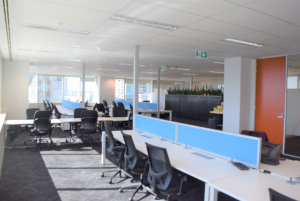One of the things I often hear from business owners is that if they just get through “this next bit, everything will be fine and we’ll be able to relax a bit”. So you might assume that with a couple of decades of business under its belt, we might have built up an ability to rest on our laurels. But as any business owner with a bit of longevity knows, laurel-resting is dangerous and it pays to keep up with the latest trends.
So when Salesforce.com recently released its Global 2019 SME trends report and I thought it might herald some interesting information. It did.
What counts as business growth?
First, I was surprised to see what Salesforce considers ‘growth’. We see so much in the press about year on year double-digit and exponential growth, that it can be easy to think if you’re not achieving 10-30-50-100% year on year after the first year or two, you’re failing. Nope – not even close. If your business has improved its revenue by 1% or more over the past two years, SF considers you’re growing.
Note: that’s revenue, not profit. Now 1% is both interesting and important. It puts into sharp focus the importance of putting one foot in front of the other every day, doing what’s necessary, making an effort certainly, but not the heroic (read: burnout) kind of effort that double or triple-digit magical unicorn growth conjures up. That sort of effort is both unrealistic and unsustainable. The other thing to keep in mind is that growth is growth even if it’s small. The Australian economy is currently growing at 2.7% so if upon review you’re ahead of that, you’re doing particularly well.
Unsurprisingly, almost 80% of business owners are optimistic about their future and 96% are looking to maintain their current business level or grow further. That having been said 68% said maintaining that growth was their biggest challenge for the next two years. So my take on that – we’re all upbeat, but digging in.
How important are SMEs to the economy
Reassuringly, in a nutshell, SMEs are vital. The global research echoed Australia’s own ABS stats. SMEs represent around 90% of the business population and are responsible for between 60-70% of all employment. Read: if our businesses fail, everyone’s out of a job. So we all need to keep doing our bit for the collective good of everyone.
Why did we start our businesses?
But really, whilst doing our part for the country is nice, we’re really in it for ourselves – and that’s a good thing.
According to the research, your ‘why’ very possibly depends on your age. Whilst most respondents stated it was all about being their own boss, if you’re a millennial, you’re more likely to have started a business to pursue a business idea you were passionate about, earn some cash as a side-gig or escape an awful work environment. Whereas, my fellow boomer were more likely to have started for flexibility, making more money or for lack of advancement reasons. Not sure where GenX got to in this survey, but it’s probably fair to say a mix of the two.
How do men and women business owners differ?
Key to all generations and both genders for achieving success were self-discipline, communication skills and drive. Things like market knowledge, money management, and leadership, whilst necessary, were deemed to be less important in the grand scale of things.
Where men and women really differed was the importance of taking risks (significantly more important to men); and communication and innovation (more important to women). Maybe that’s because the two biggest constraints in building an SME for women business owners was access to capital and not having enough time. Whereas, for men, it was the ability to hire the right talent. So women have no choice but to find innovative answers to their challenges – financial or otherwise.
What’s most critical for building/maintaining business?
Two things won out in that question and they won out by a mile. Number one was sales and very slightly behind was customer service. In other words, it’s all about winning customers and then keeping them happy.
But with almost 80% of customers expecting you to understand their needs and expectations and to connect with them via personalized experiences – keeping on top of sales and customer service is a tall order.
Of course, you can’t focus on customers if you’re so busy managing your operations (no3 on the list), or constrained by HR and IT issues or the other minutiae of business.
But luckily that’s where we can help.
SOI can help take the minutiae out of running your business with fully managed pro-workspaces that take care of everything from coffee, conferencing to cleaning and IT, virtual receptionists to answer your phone so you can concentrate and virtual booking managers that convert your callers into customers. If that sounds like something that might work for you, I’d be delighted to chat further.





